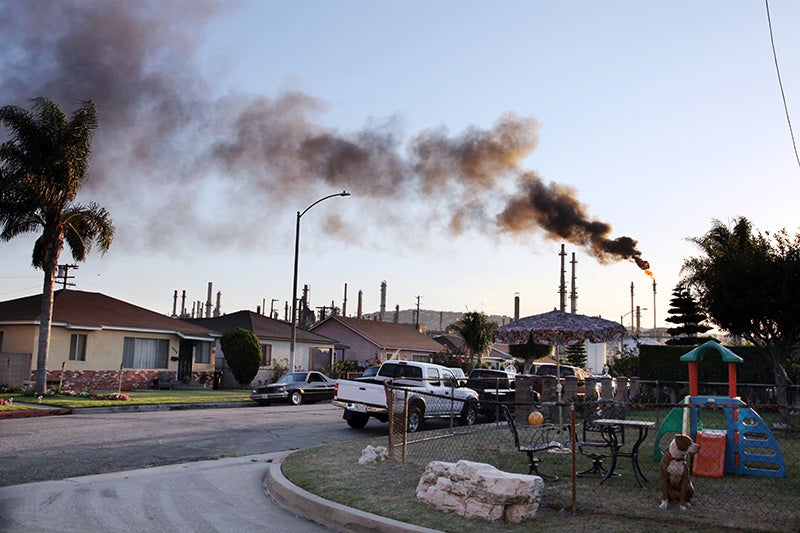California’s Leadership on Fossil Fuel Pollution Undermined by SB 674 Veto
Governor Newsom’s veto delivered a blow to pollution accountability in the state
Gavin Newsom’s recent veto of Senate Bill 674 is a profound missed opportunity. At a time when curbing fossil fuel emissions is more critical than ever, this decision undermines the state’s commitment to protecting its most vulnerable communities from the dangers of industrial pollution.
SB 674, authored by Senator Lena Gonzalez (D-Long Beach), was a crucial piece of legislation designed to provide real-time air monitoring at refineries and other polluting sites. The bill aimed to ensure that residents in fenceline communities — those living closest to these hazardous operations — would be alerted when pollution levels exceeded safe thresholds, enabling them to take necessary precautions to protect their health.
Moreover, SB 674 was designed to empower communities with critical information about the air they breathe. It would have expanded existing monitoring requirements to include nearby facilities supporting refining operations, such as storage tank terminals and sulfur recovery plants that release harmful pollutants. This transparency bill was a clear win for communities of color, who disproportionately bear the brunt of pollution in California. There is no doubt about that.
According to a Senate floor analysis, over 70% of the people living within five miles of these refineries are people of color. In some communities, like those around the Chevron Refinery in Richmond, the non-white population exceeds 80%. These communities consistently receive failing grades for particulate matter pollution on the American Lung Association’s State of the Air Report Card. Despite this, Gov. Newsom’s veto denied these communities the essential protections that SB 674 would have provided.
The reasons cited for this veto — concerns over local control and implementation costs — ring hollow in the face of the undeniable need to safeguard public health. The governor’s rationale falls far short of addressing the urgent need to protect these communities.
Importantly, these arguments do not hold up under scrutiny. The bill was crafted with flexibility in mind, allowing air quality districts to tailor monitoring requirements to their specific needs. This ensured that local agencies remained empowered to make decisions appropriate for their jurisdiction.
Additionally, the cost of implementing these monitoring systems by 2028 was to be covered by modest fees imposed on the refineries themselves, not by the state’s general fund or local governments. This approach was both fair and consistent with state law to ensure that the communities most harmed by pollution received the protections they deserve.
What makes the governor’s decision even more troubling is the strong support SB 674 received from key stakeholders. The Bay Area and South Coast Air Quality Management Districts, which oversee air quality in some of California’s most polluted regions, backed the bill. These agencies, along with environmental organizations and justice groups, recognized SB 674 as a critical tool to hold polluters accountable and protect public health and safety.
There is no question that our fenceline communities need safeguards. The risks posed by refineries are well-documented and deadly. These facilities are prone to accidents, explosions, and fires that release dangerous levels of cancer-causing chemicals like benzene and formaldehyde into the air with little to no warning. Without the enhanced monitoring and notification requirements that SB 674 would have provided, communities remain vulnerable to these dangers, unable to protect themselves or hold the parties responsible accountable.
It is unclear why Gov. Newsom chose to side with the fossil fuel industry’s talking points, but what is clear is that by vetoing SB 674, he stalled a two-year effort to increase accountability and transparency in one of California’s (and the world’s) most polluting industries. Most importantly, this decision leaves communities in the dark about the quality of the air they breathe for the foreseeable future and deprives them of the real-time data to make informed decisions about their health and safety.
This is unacceptable, so we call on the Bay Area and San Joaquin Valley air districts to update their rules. We also call on Governor Newsom to ensure all air districts provide communities with the protections SB 674 aimed to establish for the state.
At Earthjustice, we remain committed to fighting for the health and safety of all Californians, particularly those living in fenceline communities who are most at risk. The veto of SB 674 is a disappointing setback, but it will not deter our efforts to ensure that every Californian has the right to breathe clean air and thrive in a safe environment.
Earthjustice’s Community Partnerships Program works hand-in-hand with frontline communities fighting for a safe, just, and healthy environment.
